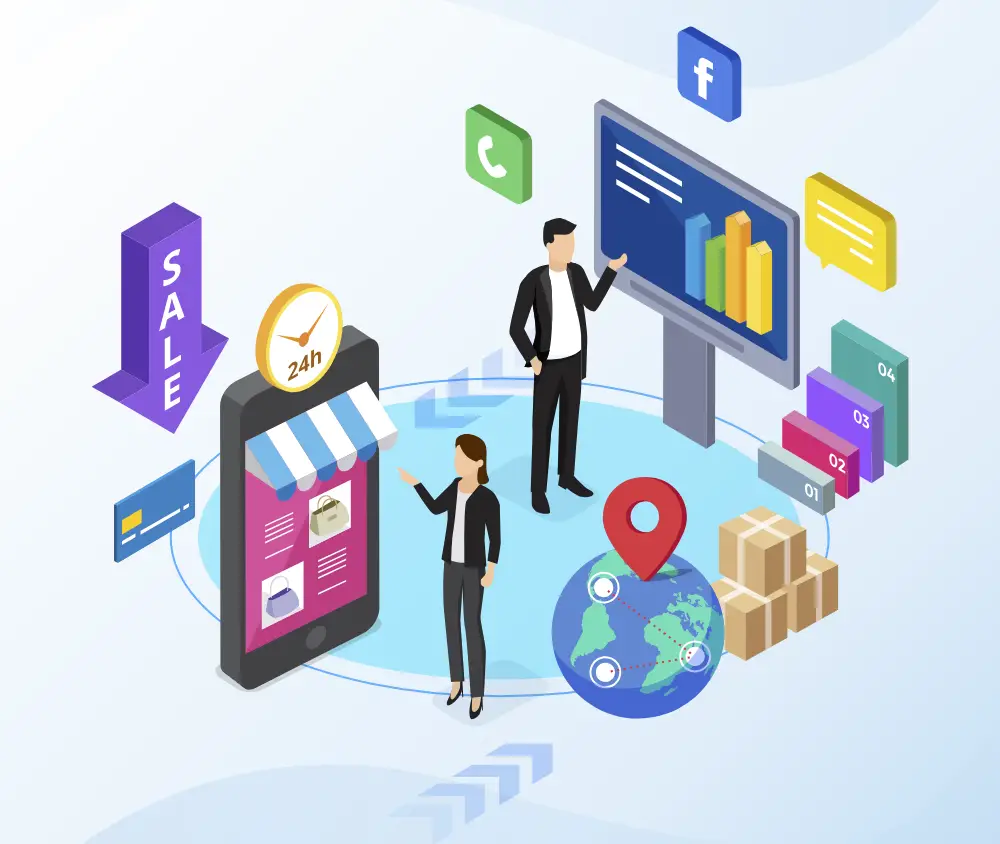-
+91 97117 68186

The future of e-commerce is becoming an amazing landscape, driven by digital marketing strategies and innovative software solutions. Let's have a look at some of the trends we can expect to see in both areas:
1. Personalized Shopping Experiences:
Digital marketing will certainly continue to concentrate on delivering individualized experiences to clients. This suggests tailoring product referrals, promos, and web content based on specific preferences and actions.
Advanced software program options, such as AI-powered recommendation engines and anticipating analytics, will allow shopping platforms to examine consumer data in real-time and supply hyper-targeted experiences.
2. Omnichannel Marketing:
Shopping brands will increasingly take on omnichannel marketing approaches, integrating numerous channels such as internet sites, social media, email, mobile applications, and physical shops.
Software applications like customer relationship manager (CRM) systems and advertising and marketing automation platforms will be essential in coordinating smooth omnichannel experiences and tracking customer communications across numerous touchpoints.
3. Visual and Interactive Web Content:
Visual and interactive content, such as 360-degree product pictures, enhanced truth (AR) try-on experiences, and shoppable videos, will likely become more common in e-commerce advertising and marketing.
Software application tools for producing and managing rich media content will empower brands to involve customers in immersive shopping experiences that drive conversion and improve brand understanding.
4. Social Commerce:
Social media site systems will continue to advance into powerful ecommerce networks with features like in-app buying, live streaming, and influencer partnerships.
Ecommerce software solutions will integrate perfectly with social media platforms, allowing brands to offer directly to customers via social channels and leverage user-generated web content for advertising.
5. Voice Business:
Voice-enabled tools and virtual assistants will expand shopping deals, allowing consumers to make acquisitions and communicate with brand names using voice commands.
E-commerce systems will be required to maximize their software application for voice search and voice-activated purchasing experiences, ensuring seamless assimilation with voice-enabled tools and supplying exact product info through natural language processing.
6. Membership Services and Loyalty Programs:
Subscription-based e-commerce versions and commitment programs will continue gaining popularity, offering consumers ease, value, and motivation to make repeat acquisitions.
E-commerce software solutions for subscription management, customer loyalty, and subscription programs will help shopping brands optimize subscription offerings, customize incentives, and foster lasting customer relationships.
7. Information Privacy and Security:
As shopping transactions rise, so do concerns regarding data privacy and security. Brand names will need to prioritize data security and conformity with policies such as GDPR and CCPA.
E-commerce software solutions will include robust safety attributes, encryption procedures, and compliance tools to protect client data and build on with consumers.
In summary, the future of shopping will be driven by digital marketing solutions and software options that make it possible for customized experiences, omnichannel involvement, visual and interactive web content, social commerce integration, voice-enabled purchasing, subscription solutions, and information personal privacy and protection. Organizations that embrace these trends and buy advanced innovation will certainly be well-positioned to flourish in the evolving e-commerce landscape.
